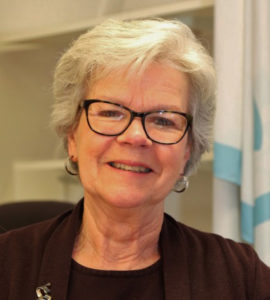Sociologist Nancy Ammerman’s first book was about Bible-believing fundamentalists living in a modern world. That was in 1987.
Her next book, published in 1992, offered a comprehensive look at the turmoil consuming the Southern Baptist Convention.
Those works, as well as her research and writing interests since then, were inspired and informed by an indelible Baptist upbringing.

Nancy Ammerman (Photo/Boston University)
“My career as a sociologist studying religious communities started from being a preacher’s kid,” said Ammerman, who is a professor of sociology of religion at Boston University.
And not just any preacher’s kid, but a Southern Baptist preacher’s kid. Eventually, that would imbue her with credibility and insights other scholars may not enjoy in researching churches.
“My family’s theology was conservative enough that I could pass in a fundamentalist church,” Ammerman said. “I could get along. I knew what they were talking about.”
The experience also imparted a natural interest in the controversies then embroiling the SBC.
“I would say things like, ‘what’s going on in the SBC is so interesting. Somebody should study this,” said Ammerman, then in her first professorial position at Emory University in Atlanta.
Eventually she made that statement to Southern Baptist journalist Walker Knight.
“Walker said, ‘Well, why not you?’”
She dove in, spending three years in intense study that included interviewing more than 100 people on all sides of the issue, including agency heads and key decision makers. Ammerman studied publications and tapes of floor debates. With the help of the Baptist Sunday School Board (now LifeWay Christian Resources), she conducted extensive surveys of more than 1,000 Southern Baptists, including pastors, Women’s Missionary Union presidents, chairs of deacon boards and others.
The resulting book, Baptist Battles: Social Change and Religious Conflict in the Southern Baptist Convention, traced the controversy’s roots not to traditional, rural Baptist churches but to Southern Baptists in urban contexts who were disturbed by a changing world, Ammerman said.
It was an experience that hit close to home.
“The more I wrote and the more I read, I thought ‘I’m living this,’” she said.
Being raised in church helped Ammerman with other aspects of sociology.
Socially, preachers’ kids are both insiders and outsiders in their congregations. Frequent moves forces them continually to establish and re-establish their roles and places in churches.
Likewise, a sociologist’s role “is to observe and learn the culture of a place” while remaining “a little bit on the outside,” she said.
Congregations impact personal faith
Ammerman said her Baptist heritage also imparted an appreciation for the important roles congregations play in personal faith. The ways religion is lived out, and how that is nurtured by religious groups, is one of Ammerman’s academic interests.
“I grew up thinking congregations were pretty important. I think my focus on congregational life is really rooted in local church autonomy.”
Access to those communities has generated a body of work that illuminates the practical roles faith plays in individual lives.
Her first project, Bible Believers: Fundamentalists in the Modern World, focused on the religious experiences of the members of an independent Baptist church in New England.
Ammerman published Pillars of Faith: American Congregations and their Partners in 2005 to describe how diverse congregations function.
She also has published articles on the spiritual-but-not-religious phenomenon and on the local, social and religious dimension of congregations, among others.
Tying much of it together is an interest in “lived religion,” or how faith is experienced and interpreted by ordinary people.
And that often overlaps with the spiritual-but-not-religious language that permeates American culture.
That phrase “gets used as a way to say, ‘I am somebody who recognizes there is a spiritual dimension to life, that there is something beyond myself — but please don’t associate me with those bad religious people,’” Ammerman said. “They are making the distinction between what they think spirituality means and what they think religion means.”
That’s one of the ways people describe their faith. Teasing out such bottom-up definitions of religious experience is important in understanding faith in American culture.
Asking people if they believe in God is often met with uncertain or negative responses.
“But if we ask, ‘Do you ever light candles, do you celebrate Christmas, do you pray on certain occasions, do you still have your rosary beads?’” she said. “Then we find out there is a layer of religious practice and a sense of religiosity that is under the surface.”
But research has demonstrated that while there is a distrust of organized religion, “there are very few people who are engaged in deep spiritual life who are not participants in religious communities,” Ammerman added.
Related story:


